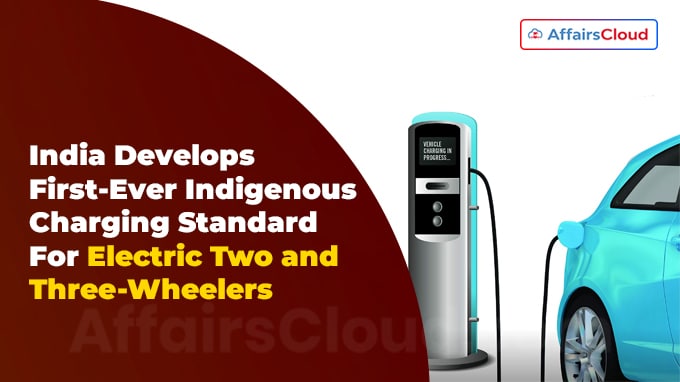 The Bureau of Indian Standards (BIS), the National Standard Body of India, has approved IS17017 (Part 2 / Sec 7): 2023, India’s first-ever indigenously developed Alternating Current (AC) and Direct Current (DC) Combined Charging connector standard for Light Electric Vehicles (LEVs).
The Bureau of Indian Standards (BIS), the National Standard Body of India, has approved IS17017 (Part 2 / Sec 7): 2023, India’s first-ever indigenously developed Alternating Current (AC) and Direct Current (DC) Combined Charging connector standard for Light Electric Vehicles (LEVs).
- It is also the world’s 1st charging standard that combines AC and DC charging for small EVs, such as electric scooters, motorcycles, three-wheelers, and quadricycles, and is designed and engineered in India.
- The new standard is based on Ather Energy’s charging connector.
Collaboration:
This new standard was developed through a collaborative effort between the National Institution for Transforming India (NITI) Aayog, the Department of Science and Technology(DST), the Automotive Research Association of India (ARAI), several EV makers like Ather, Hero, Ola Electric, and BIS.
Objective:
The new standard aims to benefit vehicle owners, manufacturers, and charge point operators by providing a unified charging system for EVs, especially in urban environments.
Note: Adopting this standard will not only benefit Indian vehicles but LEVs globally as well.
Features and Benefits of the New Standard:
i.This standard addresses a large gap that existed in the market for a standardized connector for an AC and DC combined charging system for LEVs.
ii.With a common connector for both AC (slow) and DC (fast) charging for LEVs, costs can be reduced while creating an interoperable network for charging, thus reducing the stress on the infrastructure.
iii.It also allows the Original Equipment Manufacturers (OEMs) to move away from relying on international standards and protocols and instead implement a charging system that will propel Indian innovation.
iv.The new charging connectors for LEVs offer a more practical solution compared to expensive electric 4-wheeler charging connectors.
- The distinctive charging requirements of LEVs make it impractical to adopt a 4-wheeler charging connector due to their high costs and large size.
IS 17017: Part 2: Sec 7:2023 Standard:
i.EV Conductive Charging System Part 2 Plugs, Socket-Outlets, Vehicle Connectors, and Vehicle Inlets.
ii.Section 7: Dimensional Compatibility and Interchange Ability Requirements for AC, DC, and AC/DC Pin and Contact-Tube Vehicle Couplers Intended to be used for AC/DC EV Supply Equipment where Protection Relies on Electrical Separation.
Scope of the New Standard:
i.This standard (Part 2/Sec 7) is applicable to vehicle couplers with pins and Contact-Tubes of standardised configuration intended for use in EV conductive charging systems which incorporate control means, with rated operating voltage:
- Up to 120 Volt (V) DC and rated current up to 100 Ampere (A); and
- Up to 240 V AC and rated current up to 32 A.
ii.This standard (Part 2/Sec 7) applies to DC interfaces and combined AC/DC interfaces of vehicle couplers specified in IS 17017 (Part 2/Sec 1):2020, and intended for use in conductive charging systems for circuits specified in IS 17017 (Part 31).
ii.This section of IS 17017 (Part 2/Sec 7) applies to the vehicle couplers to be used in an ambient temperature of between – 25 °C and + 55 °C.
- These vehicle couplers are intended to be connected only to cables with copper or copper-alloy conductors.
v.Accessories covered by this standard shall be of non-rewireable type only.
Ather Energy:
The company was started by the Indian Institute of Technology (IIT) Madras (Tamil Nadu) alumni, Tarun Mehta and Swapnil Jain in 2013.
- It focuses on developing advanced electric two-wheelers for the Indian automotive market.
Recent related News:
On August 5, 2023, the Bureau of Indian Standards (BIS) signed Memorandums of Understanding (MoUs) with 35 institutions across India for collaboration in standardization and conformity assessment.
About Bureau of Indian Standards (BIS):
Director-General– Pramod Kumar Tiwari
President– Piyush Goyal
Headquarters– New Delhi, Delhi
(BIS) came into existence, through an act of parliament dated 26 November 1986, on 1 April 1987




